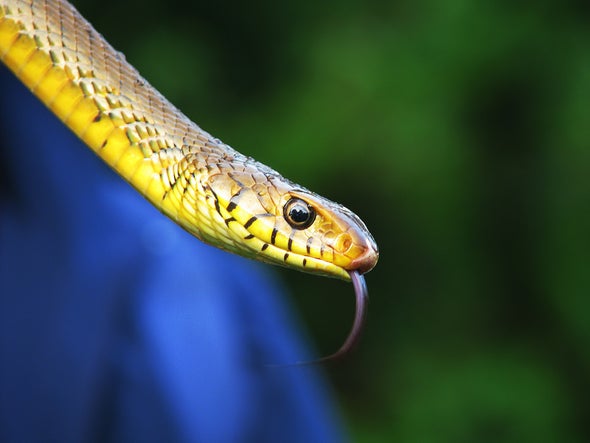How Global Warming Is Afffecting The Genes Of Animals

Warming Threatens Reptiles More Than Birds and Mammals
Over planetary history, warm-blood animals have outperformed common cold-blooded animals in adapting to changing temperatures

In the race to suit to a rapidly changing climate, warm-blooded animals might accept the border.
New enquiry suggests that over millions of years of planetary history, birds and mammals accept outperformed amphibians and reptiles at adapting to changing temperatures and shifting their habitats to more suitable locations.
The study published yesterday inNature Environmental and Evolution analyzed data on more than xi,000 vertebrate species, including fossil records from the past 270 one thousand thousand years. Comparison these records with ancient temperature reconstructions, the researchers found that warm-blooded animals had much greater success at expanding their ranges and adapting to new climate weather condition. These shifts tended to occur much more slowly in common cold-blooded animals.
"Nosotros run across that mammals and birds are meliorate able to stretch out and extend their habitats, significant they arrange and shift much easier," atomic number 82 study author Jonathan Rolland, a postdoctoral research fellow at Canada's University of British Columbia, said in a argument. "This could have a deep bear upon on extinction rates and what our world looks like in the futurity."
There are several reasons warm-blooded animals may have historically 1-upped their scaly cousins. Because birds and mammals regulate their own body temperatures, they don't have to adjust their behavior according to the outside temperature as dramatically as cold-blooded animals. Amphibians and reptiles, for instance, must often significantly scale back their activity levels in cooler weather, which puts them at a disadvantage when it comes to finding food, mates or new habitats, according to the enquiry.
Warm-blooded animals are likewise able to apply their own bodies to keep their developing babies warm, while common cold-blooded animals must stay inside suitable climate weather condition for their eggs to develop and hatch.
In the past, these traits have been particularly useful at helping birds and mammals disperse effectually the world during periods of global cooling, the researchers point out, including a major cooling episode that occurred around 34 million years ago. But some scientists believe that the current flow of rapid global warming may unduly touch on cold-blooded animals, every bit well.
Barry Sinervo, a reptile and environmental practiced at the University of California, Santa Cruz, who was non involved with the contempo study, pointed to some of his own research, such every bit a study published inScience in May 2010 that examined extinction rates in lizards alongside irresolute climatic conditions.
The study projected that as many as 20 per centum of lizard species worldwide could become extinct by 2080, and local extinctions—the disappearance of a population in one particular geographic location—could accomplish as high as 40 percent. The study besides suggested that almost 4 percent of local populations have already gone extinct since 1975.
While information technology'southward easy to call up that snakes and lizards might be happy to bask in warmer weather, reptiles—like any other animals—have their temperature limits. Every bit global temperatures continue to climb, some areas may abound besides hot for their cold-blooded inhabitants. And the new study suggests that, historically speaking, these animals are slower at expanding into more suitable habitats.
"I would have to agree with the authors, that ectotherms are at much higher risk than endotherms," Sinervo said.
Reprinted from Climatewire with permission from E&E News. E&Due east provides daily coverage of essential energy and environmental news at www.eenews.net.
Source: https://www.scientificamerican.com/article/warming-threatens-reptiles-more-than-birds-and-mammals/
Posted by: millerwiffand2002.blogspot.com

0 Response to "How Global Warming Is Afffecting The Genes Of Animals"
Post a Comment